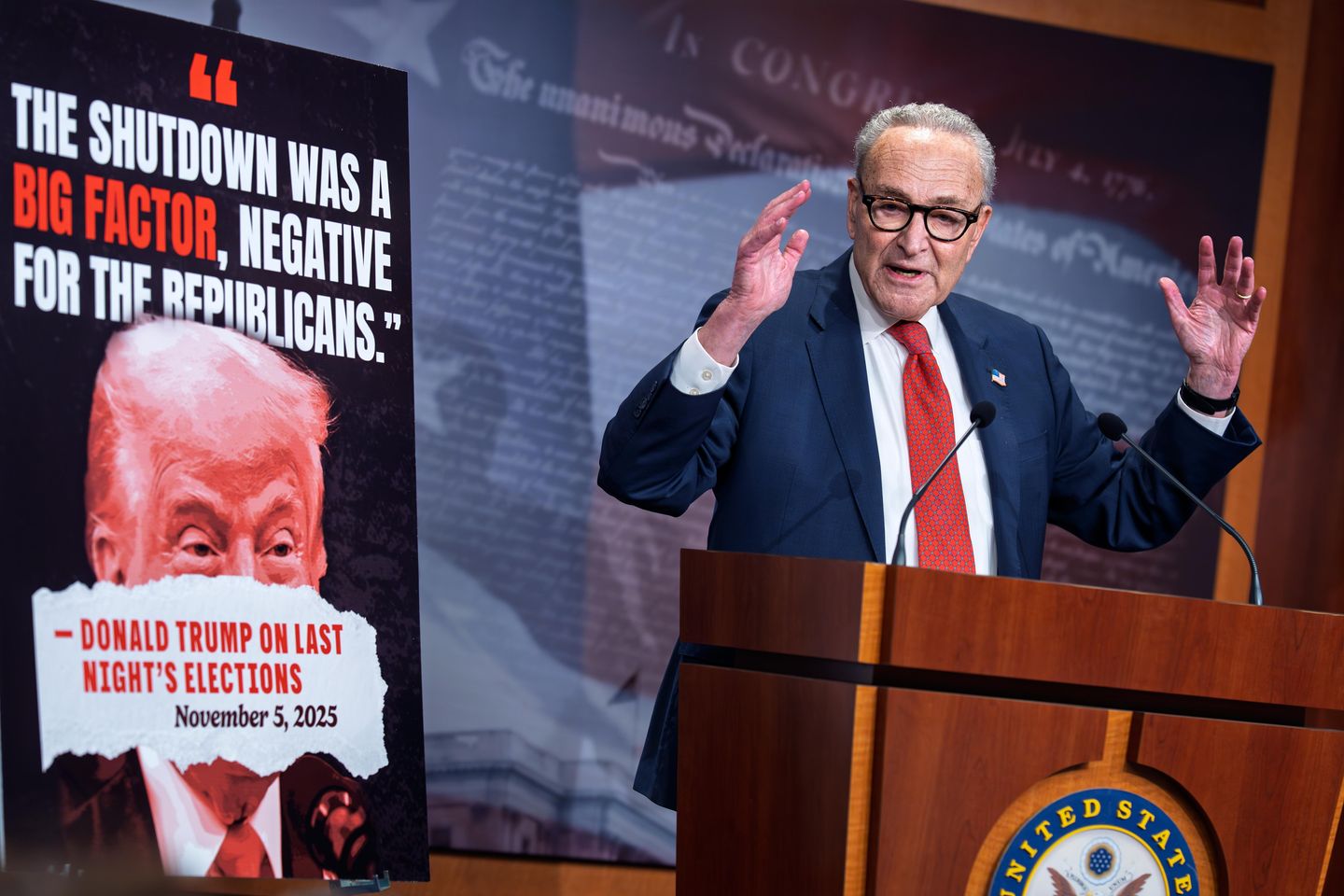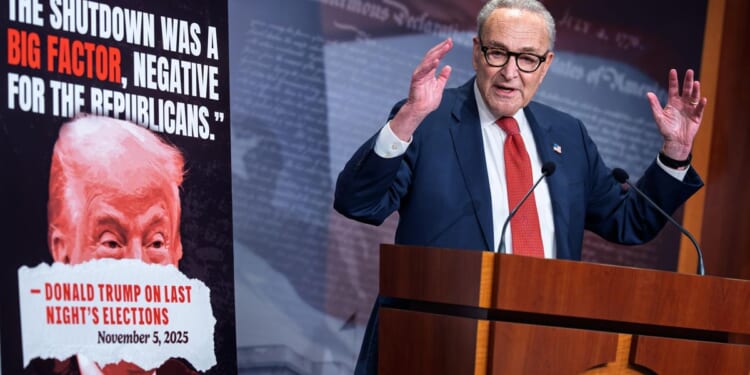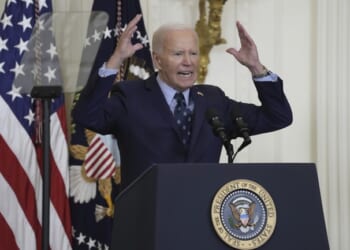
Democrats did not secure their top health care priority in the bipartisan deal to reopen the government that most in the party opposed, but they didn’t walk away empty-handed.
The minority party can tout tangible victories, such as reversing and preventing federal employee layoffs and avoiding potential cuts to Medicare.
The eight Democrats who supported the deal caved on their party’s key demand to include an extension of enhanced Obamacare subsidies. In return, they accepted the promise of a Senate vote next month on that issue, which Republicans first offered early in the shutdown.
The shutdown, which has set a new record in length, is poised to end this week. On Monday night, the Senate voted 60-40 to pass a spending package that funds most of the government through Jan. 30. It also funds the legislative branch and the departments of Agriculture and Veterans Affairs through Sept. 30, the end of the fiscal year.
The House is expected to vote on the package as soon as Wednesday, but flight delays and cancellations affecting lawmakers’ travel to Washington could delay it.
Here is what did and did not make it into the spending deal:
SEE ALSO: Shutdown surrender spurs liberal group to target Senate Democrats in 2026 primaries
In: SNAP benefits
The first-ever suspension of food stamps under the Supplemental Nutrition Assistance Program this month was a point of contention that brought Democratic senators to the table for a deal to end the shutdown.
The negotiated spending package provides longer-term certainty for SNAP than most other government programs. It will be funded through the Jan. 30 stopgap portion of the bill.
The $107 billion in mandatory funding for SNAP, included in the full-year budget for the Agriculture Department, ensures that food benefits will flow uninterrupted for the remainder of the fiscal year.
The legislation also replenishes the multiyear SNAP contingency fund to $6 billion. The fund was a point of contention in legal disputes over whether the Trump administration could pay some November benefits.
Out: Enhanced Obamacare subsidies
SEE ALSO: Schumer is now the most unpopular Senate Democratic leader on record, say polls
Democrats withstood pressure to reopen the government for weeks as they sought to persuade Republicans to negotiate an extension of their pandemic Obamacare premium subsidies, which were set to expire Dec. 31.
In the end, an extension was not included in the package, leading 39 of the 47-member Senate Democratic caucus to vote against it. Most House Democrats also plan to vote against the measure.
Those pandemic enhancements to the subsidies cap out-of-pocket Obamacare premium costs at 8.5% of household income and cover families that earn more than 400% of the federal poverty level, currently $62,600 annually for a single person or $128,600 for a family of four.
Without an extension, which some Democrats hope Republicans will negotiate in the coming weeks, premium costs are expected to more than double, on average, for 22 million Americans.
In: Preventing Medicare cuts
When Congress fails to offset legislation that would increase the deficit, as required under a law known as the Statutory Pay-As-You-Go Act, the consequence is supposed to be across-the-board spending cuts, commonly referred to in Washington as a “sequester.”
The Republicans’ One Big Beautiful Bill Act added $3.4 trillion to the deficit. Democrats said it could result in $536 billion in cuts to Medicare over 10 years under the required sequestration.
The shutdown-ending deal avoids that by, as Congress routinely does, waiving the PAYGO Act requirement.
Out: Rolling back Medicaid reductions
Democrats’ initial counteroffer for funding the government included a permanent extension of the enhanced Obamacare subsidies and a repeal of the entire health care section of the One Big Beautiful Bill Act.
Their goal, they said, was to prevent a $1 trillion cut to Medicaid spending, the largest in history.
Republicans argued that the Medicaid reductions targeted waste, fraud and abuse in the program. Democrats countered that the cuts would lead to reduced revenue for Medicaid providers and could result in the closure of rural hospitals.
The reversal of the Medicaid cuts was not included in the spending package.
In: Layoff recall and prevention
One win for Democrats was language requiring the Trump administration to recall the thousands of federal employees laid off during the shutdown and give them back pay.
The provision, pushed by Sen. Tim Kaine, Virginia Democrat, also prevents the administration from issuing any further notices of reductions in force, or RIFs, through the Jan. 30 stopgap end date.
“Two million federal workers who are not uniform military now have a guarantee of no RIFs going forward, so they don’t have to go into the holiday season with anxiety about what’s going to show up on their email one morning at 5:30 a.m.,” Mr. Kaine said. “That’s a big win.”
Out: Guardrails against rescissions and impoundments
Democrats wanted language to stop the Trump administration from ignoring Congress’ spending directives, including guardrails to prevent impoundments and rescissions.
The provisions were not included, but Mr. Kaine told The Washington Times that appropriators who worked on the deal may have had a private understanding that Republicans would not take up any rescission packages that the Trump administration might propose.
“I have a feeling there might be some handshake deal that’s easier to make. It’s hard to get the White House to say we won’t send a rescissions package when they have the statutory stature authority to do it,” he said, but “the way it gets handled by the senators once it comes over” is a different story.
Democrats succeeded in excluding from the package a House Republican provision that would have curtailed the Government Accountability Office’s ability to sue the administration over violations of the Impoundment Control Act.
In: Protections for senators’ phone records
The bill contains a provision designed to protect senators from having their phone records disclosed without their knowledge.
Senate Judiciary Republicans uncovered a document from the Biden-era FBI’s Arctic Frost investigation into President Trump’s challenges to the 2020 election results, which showed the agency had secretly obtained call records for eight Republican senators from January 2021.
A provision in the spending package requires telecom companies to notify Senate offices of subpoenas or other legal requests for a senator’s data. It does allow prosecutors to obtain court approval for delaying the notice if the senator is a target of a criminal investigation.
If the notification requirement is violated in relation to federal investigations, senators can sue for up to $500,000 in damages. The language would apply to the eight senators whose phone records were disclosed in the Arctic Frost investigation.
Out: Public broadcasting funds
Democrats’ counterproposal focused mostly on health care, but they also wanted to restore $491 million in fiscal 2026 for the Corporation for Public Broadcasting that Republicans cut through a rescissions package enacted this year.
The funds were not restored in the spending package.
In: Hemp regulation
Kentucky’s two Republican senators sparred over language in the bill to prevent the unregulated sale of intoxicating hemp-based or hemp-derived THC products, including Delta-8, from being sold online, in gas stations and corner stores.
Sen. Mitch McConnell, who championed the provision, won the fight to keep it over Sen. Rand Paul, who tried to strip the language. The Senate voted 76-24 to kill Mr. Paul’s amendment to remove the provision.
“The language included in today’s bill preserves the legitimate hemp industry while addressing the rise of intoxicating and synthetic THC products,” Mr. McConnell said.
Mr. Paul said the provision will effectively “kill the hemp industry nationwide.”
“He’s changed the definition of the plant, so every hemp plant in America will have to be destroyed, every hemp seed in America will have to be destroyed, and 100% of the hemp products that are sold will no longer be allowed to be sold,” he said.
Mr. Paul said the provision will override 20 state laws that regulate hemp-based THC products.
“In my state, you can get a hemp drink with 5 milligrams of THC in it that will be illegal under McConnell’s rules,” he said. “So he’s putting forward rules that actually contradict his own state’s rules.”
Out: Long-term funding for toxic exposure law
The bill includes nearly $53 billion for the Toxic Exposures Fund created under a 2022 law to support medical research and health benefits for veterans exposed to toxins from burn pits during their military service.
But Connecticut Rep. Rosa DeLauro, the top Democrat on the House Appropriations Committee, was disappointed the bill only added money for fiscal 2026 and lacked advance funds that have been included in past appropriations measures.
“My goal is to ensure those who have served our nation and been exposed to toxic substances have support they can count on, not to live in fear that the rug will be pulled from under them when they need help most,” she said.
In: Senator security
Amid a rise in threats against public officials, the bill includes $203.5 million in funding for the Senate and the House to enhance security measures and member protection.
“We give money for them to secure their place here [in Washington] and at home. We give them some flexibility,” Oklahoma Sen. Markwayne Mullin, the top Republican on the appropriations committee that oversees legislative branch spending, told the Times.
“It’s not just about member security; sometimes it’s about the family, especially individuals that live in a neighborhood without a gate or gated community,” he said.
Both chambers started pilot programs to give members more security protection outside of Washington, where they have Capitol Police protection.
Mr. Mullin said the funding should be enough to allow the Senate’s pilot program to provide protective detail to senators when they are outside of Washington to turn into a full service for anyone who needs it.
The bill also boosts the Capitol Police’s budget by $46 billion to $852 million for fiscal 2026 and includes $30 million for a mutual aid program that is used to reimburse state and local law enforcement when they help provide security for large-scale congressional events.
Out: Certainty past Jan. 30
Congress is required to enact 12 appropriations bills every year, and this package contains only three full-year spending bills.
The remaining nine bills, covering various government agencies, are funded at the prior fiscal year’s levels through the Jan. 30 stopgap.
That creates uncertainty about whether those portions of the government will be funded beyond January. Democrats haven’t ruled out using that deadline as a pressure point to ensure Republicans agree to some deal to extend the Obamacare subsidies.
The federal agencies that could close again after Jan. 30 include the departments of Defense, Homeland Security, Labor, Health and Human Services, Education, Energy, Housing and Urban Development, Transportation, Justice, Commerce, Interior, State, and Treasury.


![Scott Bessent Explains The Big Picture Everyone is Missing During the Shutdown [WATCH]](https://www.right2024.com/wp-content/uploads/2025/11/Scott-Bessent-Explains-The-Big-Picture-Everyone-is-Missing-During-350x250.jpg)













